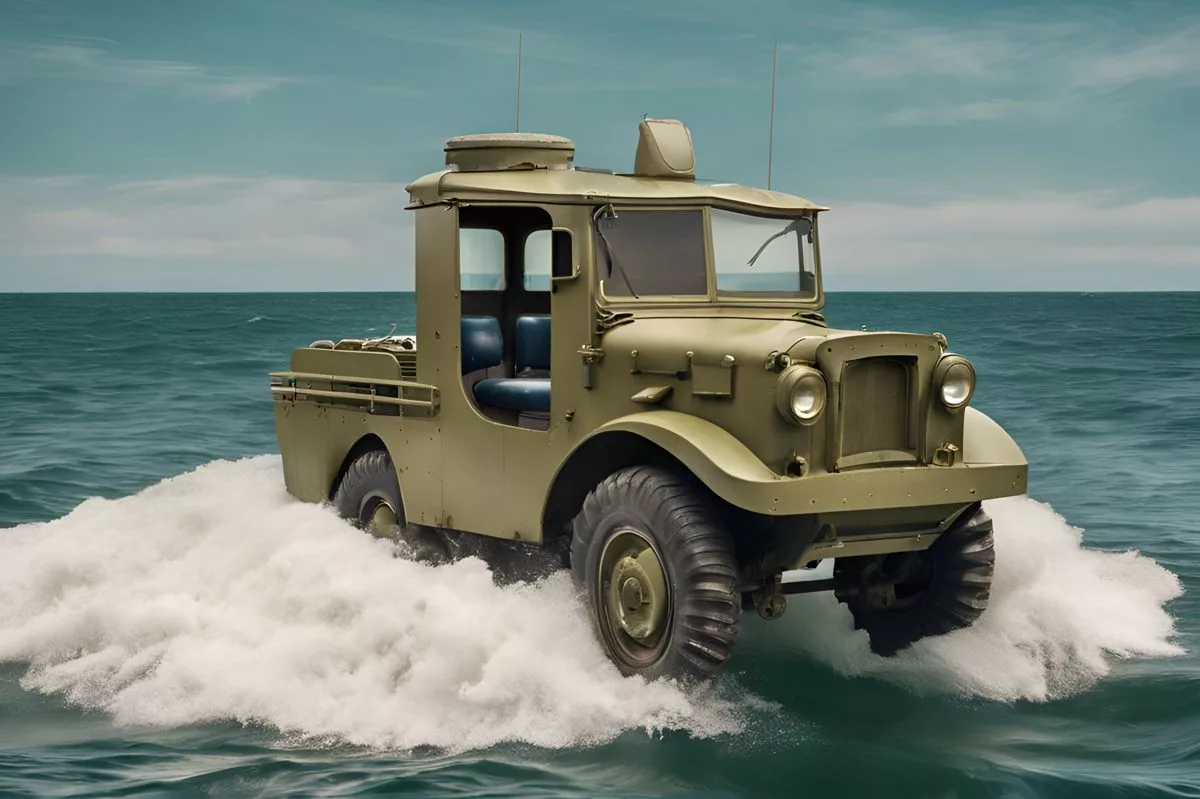The Duck, Cape Town’s floating bus, is set to revolutionize tourism with its ability to morph into a boat and offer an unmatched experience for sightseers. With a capacity of 40 passengers, The Duck provides panoramic views along the Atlantic Seaboard, symbolizing Cape Town’s spirit of innovation. Stemming from its wartime history, the transformation of this military vehicle into a provider of tranquil sightseeing tours is indeed an engaging tale, serving as a metaphorical reminder that even the most practical of tools can be repurposed for the pure joy of novel experiences.
Cape Town’s maiden floating bus, The Duck, is set to revolutionize tourism. This innovative tour bus, which morphs into a boat, offers an unmatched experience to sightseers. With its capacity to host 40 passengers, The Duck embarks on a scenic journey along the idyllic Atlantic Seaboard, providing panoramic views stretching from the road to the sea. Stemming from its wartime history, The Duck represents a brilliant fusion of historical influence and modern novelty, symbolizing Cape Town’s spirit of innovation.
Nestled in the heart of South Africa, Cape Town, otherwise known as the Mother City, is set to become home to an innovative marvel that will revolutionize tourism – the country’s maiden floating bus. Slated to be unleashed by the month’s end, this forward-thinking tour bus, fittingly called ‘The Duck’, is primed to morph into a boat, providing an unmatched experience to tourists.
The Unique Journey Begins
The starting point to this unique journey is at the V&A Waterfront, a vibrant center brimming with culture and history. As The Duck embarks on its scenic journey along the idyllic Atlantic Seaboard, sightseers are treated to the tranquil panoramas stretching from the road to the sea. With the capacity to comfortably host 40 passengers, The Duck, after its picturesque drive, graces the waters of the V&A Marina and Harbour with an impressive plunge. This flawless shift from earth to water indeed guarantees an unforgettable spectacle.
A Fascinating History
The existence of The Duck is rooted in a fascinating narrative. The concept of these amphibious buses, affectionately referred to as ‘Ducks,’ is traced back to the World War II era. The General Motors Corporation was the innovator behind the original Ducks, also known as ‘DUKWs,’ crafted for use during the war. These versatile vehicles played a crucial role for the allied forces, transporting soldiers and provisions across hazardous terrains and bodies of water.
Following the war, numerous Ducks were repurposed for civilian use, specifically for tourist services, and gained significant popularity in the United States. The Ducks in Boston are among the most famed, with around 40 Ducks enhancing the region’s allure. Nowadays, the allure of this distinctive experience has permeated international cities including Singapore, London, and Rotorua.
Transformation into a Tourist Attraction
The Duck’s presence in Cape Town is the result of Keith Lindsay’s relentless efforts. His steadfast determination resulted in the successful procurement of the required permits and safety precautions, guaranteeing the bus’s operation both on land and water. The last remaining challenge is the road certification from the Cape Town traffic department. Once this is achieved, the tours will commence to cater to the enthusiastic tourists.
The official inauguration of The Duck is scheduled for 31st July, 2024. Prioritizing passenger safety, the water tour will be limited to the harbor’s boundaries, ensuring that the passengers remain within safe waters.
A Testament to Innovation
This novel initiative of The Duck symbolizes Cape Town’s spirit of innovation, further enhancing its array of attractions. It represents a brilliant fusion of historical influence and modern novelty, reflecting the city’s principle of valuing tradition while embracing innovation.
Serving as a conduit between land and sea, and also the past and the present, The Duck is prepped to undertake a journey in the realm of serene tourism. Stemming from its wartime history, the transformation of this military vehicle into a provider of tranquil sightseeing tours is indeed an engaging tale.
From Warzone to Tourist Hotspot
As the countdown to the unveiling of The Duck in Cape Town begins, we find ourselves reflecting on the transformative journey of this amphibious vehicle. Transitioning from a combat tool to a leisure asset, from a warzone necessity to a tourist attraction, The Duck’s journey is a remarkable evolution story. It serves as a metaphorical reminder that even the most practical of tools can be repurposed for the pure joy of novel experiences.
1. What is The Duck in Cape Town?
The Duck is a floating bus that offers a unique experience for sightseers. It can morph into a boat and has a capacity of 40 passengers.
2. What is the starting point for The Duck tour in Cape Town?
The starting point for The Duck tour in Cape Town is at the V&A Waterfront, a lively center filled with culture and history.
3. What is the history behind The Duck?
The concept of amphibious buses, affectionately referred to as ‘Ducks,’ is traced back to the World War II era. The General Motors Corporation was the innovator behind the original Ducks, also known as ‘DUKWs,’ crafted for use during the war. These versatile vehicles played a crucial role for the allied forces, transporting soldiers and provisions across hazardous terrains and bodies of water.
4. Who brought The Duck to Cape Town and what is the inauguration date?
Keith Lindsay brought The Duck to Cape Town and successfully procured the required permits and safety precautions. The official inauguration of The Duck is scheduled for 31st July, 2024.
5. What does The Duck symbolize for Cape Town?
The Duck symbolizes Cape Town’s spirit of innovation, further enhancing its array of attractions. It represents a brilliant fusion of historical influence and modern novelty, reflecting the city’s principle of valuing tradition while embracing innovation.
6. What is the significance of The Duck’s evolution story?
The Duck’s evolution story serves as a metaphorical reminder that even the most practical of tools can be repurposed for the pure joy of novel experiences. It transitioned from a combat tool to a leisure asset, from a warzone necessity to a tourist attraction.








